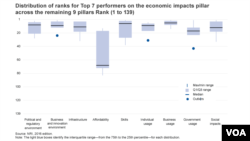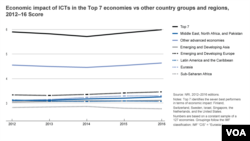A report by the World Economic Forum finds technologically savvy countries are coming out ahead economically and in societal development. This year’s Global Information Technology Report says Singapore tops the list of 139 ranked countries, followed by Finland, Sweden, Norway, and the United States. Burundi and Chad rank at the bottom.
The report finds seven countries, Finland, Switzerland, Sweden, Israel, Singapore, the Netherlands and the United States, are leading the world in getting the most economic impact from investments in information and communications technologies, or ICT.
It says this group of high-achieving economies is doing 33 percent better than other advanced economies and 100 percent better than emerging and developing economies. It says a supportive, enabling environment is critical for success.
The report finds countries that are benefiting most from the digital technologies have quality infrastructure, good business regulations and a ready skills supply.
World Economic Forum Spokesman Oliver Cann says consumers, rather than businesses and governments are driving the digital revolution.
“We are finding a very laggard contribution, especially from government, which has stagnated over the past few years. I am taking a global view here, there are obviously exceptions. And also business as well. We all think global business is driving ahead, but actually they could be doing a lot more. On the other hand... I think the consumer and consumer uptake of the Internet is really far exceeding the contributions and the efforts of governments and business,” Cann says.
Middle East, Africa up-and-coming
The report finds Europe remains at the technology frontier, with seven of the top-ranked countries coming from that region. But senior economist and author of the report Silja Baller tells VOA there is some very encouraging news coming from parts of the Middle East and sub-Saharan Africa.
“There we have some of the largest movers this year. So, we see countries like Lebanon making big strides in the index. South Africa is moving up and Cote d’Ivoire is one of the examples where the government has really been behind the digital agenda, where they are really driving impact and Ethiopia is another country that we are seeing moving up in the index this year,” Baller says.
Specifically, Baller noted that South Africa has made ICTs more affordable by dropping tariffs on mobile access, while Ivory Coast has strongly improved its business environment.
In 2013, it took an average of 32 days to open a new business in Ivory Coast, she says. Today, it takes only seven.
The report says the digital divide is widening between rich and poor countries due in large part to a yawning gap in infrastructure, such as high-speed internet.
The authors say infrastructure is not the only factor leading to economic growth, but it is a major factor in holding back less developed economies in the digital age.






